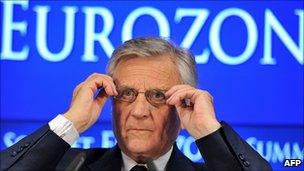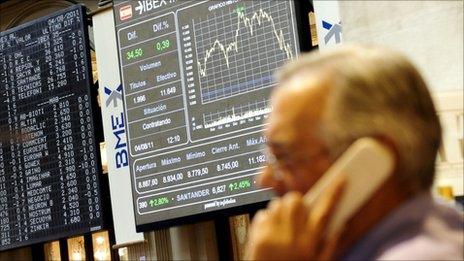Euro crisis: What on earth does ECB do now?
- Published
- comments
Global stock markets slump on eurozone debt fears
The question lurking, with growing alarm, in the minds of Europe's politicians this week has been what on earth do they do now?
Market confidence is once again drying up, just as everyone is about to head off for the beach - and the half-measures agreed at last month's Summit are not even half-implemented.
The answer has come, again, today in the form of the European Central Bank, reluctantly filling the gap between a single European currency and its very un-singular politics.
It has restarted the bond purchasing scheme it began when the crisis got serious in May 2010, and has not activated since March.
The central bank has also restarted the full range of emergency lending for Europe's banks, whose share prices were hammered again on Thursday by doubts about the euro - and the global recovery.
Tepid actions are better than no action at all, and some of the moves clearly come under its formal job description. It can't stand idly behind in the face of another possible European credit crunch, as my colleague Robert Peston has written about.
But investors also know that the central bank is deeply uncomfortable intervening in markets to support individual governments. That is supposed to be a job for the politicians - which is probably why we have not heard anything yet about ECB president Jean-Claude Trichet buying Italian debt, or Spanish.
There is chatter in the markets about the ECB stepping in to "fill in" for the EFSF, while the governments pass the legislation needed to turn it into that "European Monetary Fund" which President Sarkozy promised last month.
Perhaps that is what will happen. But when it comes to its formal constitution, the ECB is by some measure the most independent central bank of any major economy. And no-one is a more staunch defender of its independence than Mr Trichet. At least in theory.
Unlike the Bank of England, for example, the ECB gets to write its own definition of price stability. Governments can't change its mandate - or expand on it. It's not even obvious, from the relevant statutes, that the countries of the eurozone could ever get rid of it.
Accountability
This was a pre-condition for German support for the entire single currency project: there could be no question of the ECB bowing to the whims of the French - or for that matter, the Italians.
But I'm starting to wonder whether the ECB - and the single currency - might be better off if it were more beholden to politicians, with a clear chain of accountability from democratically elected governments.

ECB president Jean-Claude Trichet wants governments to step up to the plate to save the euro
Why? Because at least then, the political ramifications of the ECB's policies would be clear for all to see. The national governments would be able to clearly instruct the institution to act as the last line of defence for the euro, including the creation of unlimited amounts of liquidity.
You never know - with a clear mandate telling it play this role, it might even be able to do it more cheaply. Markets might actually believe that the ECB was willing to do "everything it took" to protect the European banking system and the integrity of the single currency, and investors might stop putting it to the test.
Naturally, this would involve some reputational risk, just as buying government debt as part of quantitative easing presented risks to the reputation of the Bank of England.
But I doubt you would find anyone at Threadneedle Street sorry that it's the elected British government that decides on the Bank's mandate, or sorry that the Chancellor - then Alistair Darling - had to formally indemnify the Bank against losses resulting from its emergency purchases of private assets.
Uncertain worth
But now back to reality. None of this is possible in the eurozone, for the same reason that the crisis itself has been so hard to stop - because there is no institutional mechanism for putting the ECB, or anyone else, in charge.
The upshot is that we have a massive emergency lending programme by the ECB, which no elected government ever formally sanctioned - and which has resulted in a mountain of assets, of uncertain worth, sitting on the central bank's balance sheet. They may not know it yet, but any big losses on those assets will ultimately be borne by European taxpayers.
Because none of this is transparent, we do not see confidence in the markets that the ECB's support of the single currency will be open-ended, which is what you need for a lender of last resort to actually do its job.
Every time the markets turn south, what we see, instead, are governments and investors holding their breathe to see which way Mr Trichet will jump - hoping that a reluctant ECB can fill institutional gaps in the euro system which it was never intended to fill.
As we saw from his press conference on Thursday, Mr Trichet wants governments now to step up to the plate to save the euro. It might have made his life easier over the past two years if those governments had been able to say the same to him.
- Published4 August 2011
- Published4 August 2011
